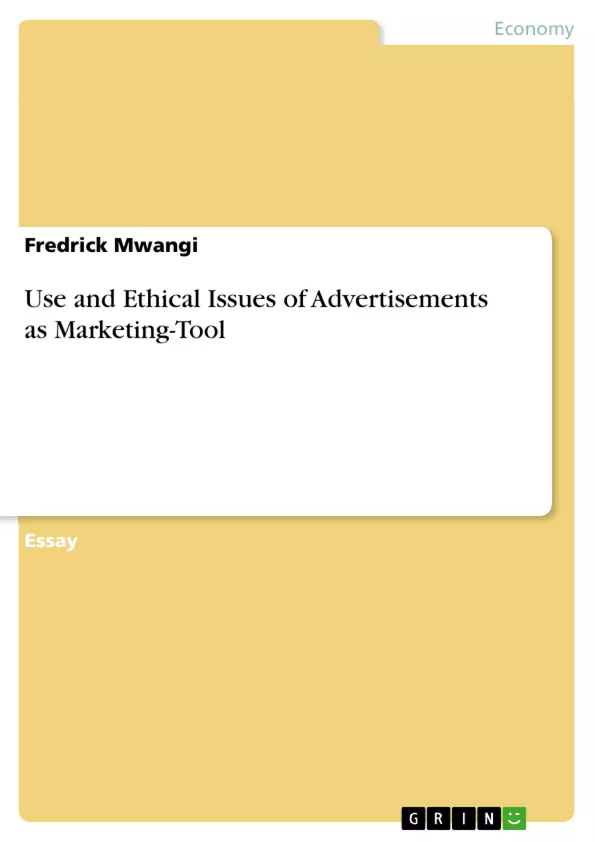Globalization and improved technology have increased competition that has forced many organizations to invest heavily in promotions and advertisements. Inherently, advertising is a powerful tool for reaching the consumers, introducing new products, and increasing sales. It enhances the company reputation and brands in the market. Moreover, it helps to educate the public about the products and services that are in the market; hence, increasing the sales. Therefore, advertising provides the consumers with information so that they can make informed decisions.
Table of Contents
- Task One: The Ethical Responsibilities of Marketing Managers in Advertising
- Task Two: Combating Misleading Advertising and Unethical Marketing Practices
Objectives and Key Themes
This text examines the ethical responsibilities of marketing managers, particularly within the alcohol advertising industry. It aims to analyze the impact of advertising on consumers, focusing on the potential for misleading or harmful messages. The text explores strategies for promoting ethical advertising practices and mitigating negative consequences.
- Ethical considerations in advertising
- Social responsibility of marketing managers
- The impact of misleading advertising
- Consumer protection and rights
- Strategies for ethical advertising practices
Chapter Summaries
Task One: The Ethical Responsibilities of Marketing Managers in Advertising: This chapter delves into the ethical obligations of marketing managers in creating and disseminating advertisements, particularly focusing on the alcohol industry. It emphasizes the importance of truthful and accurate information, highlighting the potential negative consequences of misleading or manipulative advertising, such as endangering vulnerable populations (pregnant women, underage consumers) and damaging the company's reputation. The chapter stresses the importance of considering societal norms and values, advocating for transparency, and promoting responsible consumption. It explores theories of persuasion and how advertisers can avoid techniques that exploit consumer vulnerabilities. The text underscores the necessity for ethical marketing practices to foster trust and ensure informed decision-making amongst consumers, while maintaining a balance between persuasiveness and honesty.
Task Two: Combating Misleading Advertising and Unethical Marketing Practices: This chapter addresses the ongoing debate surrounding misleading advertising and unethical marketing practices, particularly in the context of technological advancements in online platforms. The chapter introduces and discusses various ethical frameworks (idealism, relativism, and pragmatism) that consumers may use to assess the appropriateness of advertisements. The author emphasizes the importance of developing strong ethical standards within organizations, including creating clear mission statements that promote ethical conduct among employees and holding them accountable for their actions. The discussion also emphasizes the role of consumers in combating unethical practices through vigilance and reporting, as well as the necessity of collaboration between marketing managers, government agencies, and consumer protection groups. The chapter concludes by highlighting the specific ethical concerns surrounding alcohol advertising, such as underage drinking, and suggesting measures to mitigate these risks.
Keywords
Ethical advertising, social responsibility, misleading advertising, consumer protection, alcohol advertising, marketing ethics, ethical frameworks, underage drinking, responsible consumption, stakeholder engagement.
Frequently Asked Questions: Ethical Responsibilities of Marketing Managers in Advertising
What is the main focus of this text?
This text examines the ethical responsibilities of marketing managers, specifically within the alcohol advertising industry. It analyzes the impact of advertising on consumers, focusing on misleading or harmful messages, and explores strategies for promoting ethical advertising practices.
What are the key themes explored in the text?
Key themes include ethical considerations in advertising, social responsibility of marketing managers, the impact of misleading advertising, consumer protection and rights, and strategies for ethical advertising practices.
What topics are covered in Task One: The Ethical Responsibilities of Marketing Managers in Advertising?
Task One delves into the ethical obligations of marketing managers in creating and disseminating advertisements, particularly concerning the alcohol industry. It emphasizes truthful and accurate information, highlights the negative consequences of misleading advertising (endangering vulnerable populations, damaging company reputation), and stresses considering societal norms, transparency, and responsible consumption. It explores persuasion theories and how to avoid exploiting consumer vulnerabilities, advocating for ethical practices to foster trust and informed decision-making.
What topics are covered in Task Two: Combating Misleading Advertising and Unethical Marketing Practices?
Task Two addresses misleading advertising and unethical marketing practices, particularly in online contexts. It discusses ethical frameworks (idealism, relativism, pragmatism) for assessing advertisements, emphasizes developing strong ethical organizational standards, and highlights the role of consumers and collaboration between marketing managers, government, and consumer protection groups in combating unethical practices. It specifically addresses ethical concerns surrounding alcohol advertising, such as underage drinking, and suggests risk mitigation measures.
What are some key ethical concerns discussed regarding alcohol advertising?
Key ethical concerns surrounding alcohol advertising include the potential to endanger vulnerable populations (pregnant women, underage consumers) and the risk of promoting irresponsible consumption. The text highlights the importance of mitigating these risks through ethical advertising practices and regulatory measures.
What ethical frameworks are mentioned in the text?
The text mentions idealism, relativism, and pragmatism as ethical frameworks that can be used to assess the appropriateness of advertisements.
What is the role of the consumer in combating unethical advertising?
Consumers play a crucial role in combating unethical advertising practices through vigilance and reporting. Their active participation in identifying and reporting misleading or harmful advertisements is vital for creating a more ethical advertising landscape.
What strategies are suggested for promoting ethical advertising practices?
Strategies for promoting ethical advertising practices include developing strong internal ethical standards within organizations, creating clear mission statements promoting ethical conduct, holding employees accountable, fostering transparency, and promoting responsible consumption. Collaboration between marketing managers, government agencies, and consumer protection groups is also emphasized.
What keywords are associated with this text?
Keywords include ethical advertising, social responsibility, misleading advertising, consumer protection, alcohol advertising, marketing ethics, ethical frameworks, underage drinking, responsible consumption, and stakeholder engagement.
- Quote paper
- Fredrick Mwangi (Author), 2015, Use and Ethical Issues of Advertisements as Marketing-Tool, Munich, GRIN Verlag, https://www.grin.com/document/294381



